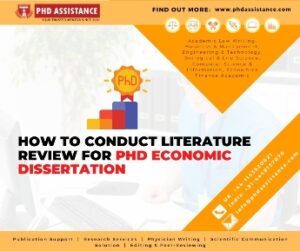How to Conduct Literature Review for PhD Economic Dissertation
Literature review: Introduction
A critical evaluation of the read and gathered resources (literature) regarding the particular subject (economics) and then identifying a gap, if any in the literature gathered earlier is basically what we call a dissertation literature review. A Dissertation Literature Review can be a basic summarization of important source materials or it can also be a critical assessment of the research materials for conveying a personal opinion on the same.

The basic summarization isn’t authentically a perfect A Dissertation Literature Review since it extends much beyond that. A Dissertation Literature Review is something that might bring a new perspective regarding a classic Research Paper there might also be a combination of both the old interpretations as well as that of the new. A literature review might also include outlining of developments in a field, critically made and focused on major debates that are polemical in nature. Literature reviews also include source assessments for the reader to realize its validity and pertinence to the particular subject that is under research.
There is a major confusion that still prevails on a general basis regarding academic papers and literature review while they are not really the same thing. Academic papers aim at providing a particular subject with new research material while literature reviews form a part of this process. In other words, in academic papers, the basis of it is formed by the literature reviews helping in highlighting any kind of research gap that might have been left unnoticed.
How to Economic Literature review write: what are the necessary steps to be kept in mind?
- Identifying sources: for starting to Write a Economic Dissertation, we need to have a narrowed down list of resources that we want to used for the review. We should go through other literature reviews on the economic subject with specific topics. As we go through this, we need to Choose a Topic to be Reviewed and with this we simply need to narrow down the list of contents to be used since otherwise subjects become too massive to be gone through thoroughly.
- Going through the identified sources: as we finish organizing our sources, we need to start going through them thoroughly one by one. We can lookout for articles to be used in the dissertation in some of the economics databases, preferably Primarily a skimming should be done on the abstracts, methodologies and references and items relating to our topic should be only used. After this a Citation Chase should be conducted with related books and topics.
- Considering gaps in the sources: one of the most important things to be done in a Economics Dissertation Literature Review is to identify the research gaps in the sources. Notes should be kept while reading through the sources. Gap identification is specifically important in case such review forms a Part of a Research Proposal. Such review shall be shall be deemed to have been designed to fill the identified gaps. Identification of gaps is also considered as a part of critical analysis of the subject and sources.
- Starting to write the reviews: now that we have organized and went through all the resources, we can already start seeing the patterns and are all ready to start writing our review. We should write our review keeping in mind the audience and that the sources are chronological in order and are as current as possible, author controversies are referred to, it is concise and focused on the thesis statement, sample literature reviews are used as citations and proper paragraphing is maintained.
- Adding conclusion: the implications of the source material should be summarized and added to the conclusion section of the review and then such summary should be linked to the arguments and general research questions.
The gaps found in the literature should be exposed in the conclusion and possible rationale for future research should be suggested.
Some other miscellaneous points to be remembered
- Being selective: it is important to be selective regarding the sources used in the review. Detailed writing is not necessary in every section. Using terms like ‘robust’ ‘ample’ helps in avoiding details regarding a topic, than necessary.
- Usage of ample evidence: one of the most important parts of a literature review is the usage of a large number of evidences from various sources to back the used arguments in the review.
- Lesser reliance on direct quotes: quotes in a review should be used as least as possible and only to emphasis a point
- Proper referencing: referencing should properly be done in each of the projects with the specified referencing style.
References
- Verme, P., & Schuettler, K. (2021). The impact of forced displacement on host communities a review of the empirical literature in economics. Journal of Development Economics, 102606.
- Fazio, G. (2021). A Review of Creative Trade in the Economics literature. PEC Discussion Paper.
- Schmitt, A., & Hörner, S. (2021). Systematic literature review–improving business processes by implementing agile. Business Process Management Journal.
- Brodeur, A., Gray, D. M., Islam, A., & Bhuiyan, S. (2020). A Literature Review of the Economics of COVID-19.
- Woessmann, L., & Bettinger, E. (2020). Literature Review Article: New Directions in the Economics of Higher Education. New Directions in the Economics of Higher Education.
 Previous Post
Previous Post Next Post
Next Post
